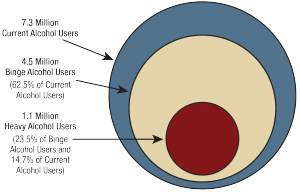ARTICLE SUMMARY: Know the difference between regular and problem drinking. This article reviews the main signs of a problem. We’ll also guide you on what to do if your drinking is out of control.
ESTIMATED READING TIME: 5 minutes.
TABLE OF CONTENTS
- Is My Drinking a Problem?
- Signs of a Drinking Problem
- What to Do About It?
- Causes and Origins
- How Many People Drink?
- Other Resources
- Your Questions
A drinking problem exists when you drink too much, too fast, or too often, says the National Institute on Alcohol Abuse and Alcoholism.
Is My Drinking a Problem?
There is a difference between social drinking and alcohol abuse. Knowing the difference can save you a lot of time. The NIAAA website Rethinking Drinking outlines the following guidelines.
“At-risk” or “heavy” drinking is defined as:
Men: More than 4 drinks on any day or 14 per week
Women: More than 3 drinks on any day or 7 per week
About 1 in 4 people who exceed these limits can be diagnosed with alcoholism. Others who drink this way are at greater risk for developing these and other problems over time. Again, individual risks vary. People can have problems drinking less than these amounts, particularly if they drink too quickly.
Drinking is a problem if it causes trouble in your relationships, in school, in social activities, or in how you think and feel.
Signs and Symptoms of Alcoholism
Drinking problems are not measured by the amount someone drinks or how often they drink. What matters most is how drinking affects your life. The main sign is this:
You may have a drinking problem if you cannot quit drinking despite negative consequences.
Still, here’s a checklist of the main signs of a problem. If you have even one of these signs, we suggest you ask for professional help.
- I cannot cut back on drinking or quit on my own.
- I drink more than I intend.
- I have trouble at work, home, or school because of alcohol.
- I have trouble with relationships because of drinking.
- I miss important work, school, or social activities because of alcohol use.
- I spend a lot of time getting, drinking alcohol, or recovering from its effects.
Less than 10% of people who need help for drinking problems get treatment. Don’t wait to be a statistic. Call now.
Ways to Overcome Alcoholism
1. CALL OUR HOTLINE NUMBER.
If you are struggling with alcohol abuse or addiction, and you want someone to talk to about it, we can help. Our certified addiction recovery specialists can talk to you about your problem and help you find healthy ways to overcome it.
2. FIND A THERAPIST.
The main treatment for a drinking problem is talk therapy. While medications for alcohol use disorders can be helpful, treatment is most successful when medicines are combined with behavioral treatments.
3. GET A DIAGNOSIS.
Alcohol problems can be diagnosed by a handful of medical and mental health professionals. In many cases, your primary physician can get the process started. Your physician can assess you relationship with alcohol and refer you to specialist help. However, you may also want to consult personally with any of the following:
A licensed clinical social worker. Social work practice in behavioral health promotes well-being through by assessment, diagnosis, treatment, and prevention of mental illness, substance use, and other addictions. The National Association of Social Workers has created a list of suggestions for how to find a social worker.
An addiction medicine specialist. Doctors who are trained in addiction medicine are certified by the American Board of Addiction (ABAM )medicine. These specialty MDs provide prevention, screening, intervention and treatment for drinking and drug problems. The ABAM member directory can be found here.
A psychotherapist. Therapists all over the country are experienced in identifying alcohol problems. You can learn more about addiction on The American Psychological Association (APA) website or search the APA directory to Find a Therapist near you.
A psychiatrist. Psychiatrists specialize in the diagnosis, treatment, and prevention of substance use disorders. Training includes four years of medical school and at least three additional years in a psychiatric residency. Complete the quick search in the Find a Psychiatrist search tool on the American Psychiatric Association (APA) website.
Causes of Alcoholism and Origins
Not everyone who drinks regularly will have a drinking problem. The Centers for Disease Control (CDC) report that about 90% of people who drink excessively would not be expected to meet the clinical diagnostic criteria for having a severe alcohol use disorder.
So, what can cause some people to drink too much, while others can drink socially? This NIAAA brochure on Family History and Alcoholism sheds some light.
According to the NIAAA, many scientific studies, including research conducted among twins and children of alcoholics, show that genetic factors influence alcoholism.
In fact, children of alcoholics are about four times more likely than the general population to develop alcohol problems. Research also shows that how parents act, how they treat each other, and how parents treat their children has an influence.
Researchers believe, then, that a combination of genetics and environment influence alcoholism. A person’s risk of a drinking problem increases if s/he is in a family with the following difficulties:
- An alcoholic parent is depressed or has other psychological problems.
- Both parents abuse alcohol and other drugs.
- Conflicts lead to aggression and violence in the family
- The parents’ alcohol abuse is severe.
Half of all Americans are active drinkers. And 6% of all Americans aged 12 and older can be diagnosed as having a drinking problem. And less than 10% of them ever get treatment.
How Many People Drink Alcohol?
According to the 2016 NSDUH, The National Survey on Drug Use and Health, about half of all Americans drank some form of alcohol in the past month. But not all of these 136.7 million current alcohol users aged 12 or older in 2016 had a drinking problem.
An estimated 16.3 million Americans aged 12 or older in 2016 were heavy alcohol users in the past month, representing 6 percent of the population. Heavy, at-risk drinkers self-reported drinking in the past month and mainly belong to the following age groups:
- 191,000 adolescents aged 12 to 17 (0.8 percent) engaged in binge drinking on 5 or more days.
- 3.5 million young adults aged 18 to 25 (10.1 percent) were heavy alcohol users in the past month.
- 12.6 million adults aged 26 or older (6.0 percent) were heavy alcohol users in the past month.
Of top concern is 12-20 year olds, who are featured in Figure 12, 2016 NSDUH.
According to the NIAAA, less than 10 percent of people who need help for drinking problems receive any treatment.
Still, help is available.
Don’t wait to be a statistic.
Call for help.
Other Resources
American Academy of Addiction Psychiatry
www.aaap.org
401–524–3076
American Psychological Association
www.apa.org
1–800–964–2000 (ask for your State’s referral number to find psychologists with addiction specialties)
American Society of Addiction Medicine
www.asam.org
301–656–3920 (ask for the phone number of your State’s chapter)
NAADAC Substance Abuse Professionals
www.naadac.org
1–800–548–0497
National Association of Social Workers
www.helpstartshere.org (search for social workers with addiction specialties)
National Clearinghouse for Alcohol and Drug Information
www.samhsa.gov
1–800–729–6686
National Institute on Alcohol Abuse and Alcoholism
www.niaaa.nih.gov
301–443–3860
National Institute on Drug Abuse
www.nida.nih.gov
301–443–1124
National Institute of Mental Health
www.nimh.nih.gov
1–866–615–6464
Substance Abuse Treatment Facility Locator
www.findtreatment.samhsa.gov
1–800–662–HELP
Get Help for an Alcohol Abuse
We hope to have gotten you started on a road to wellness. We also understand that there can be significant barriers to getting help. So, if you still have a question about a drinking problem, please ask us in the comments section below.
We do our best to respond to all real-life questions with a personal and prompt reply.










Related Posts